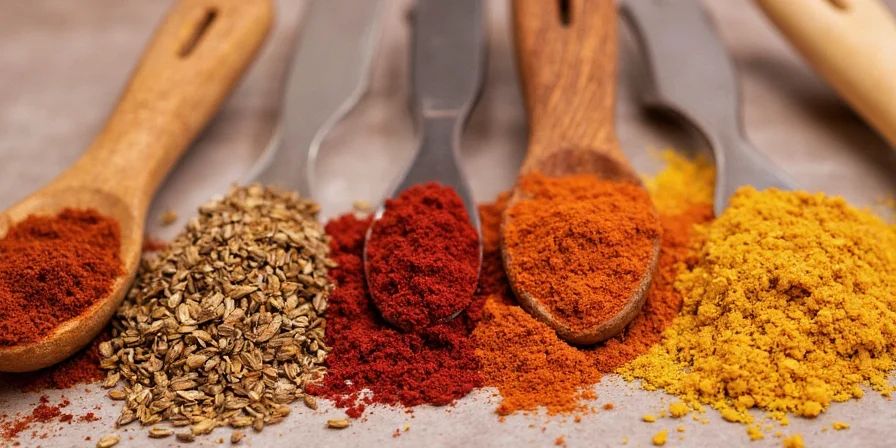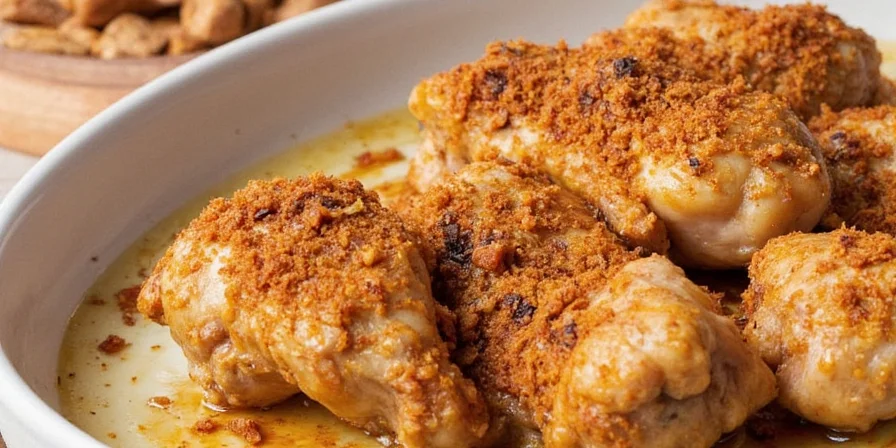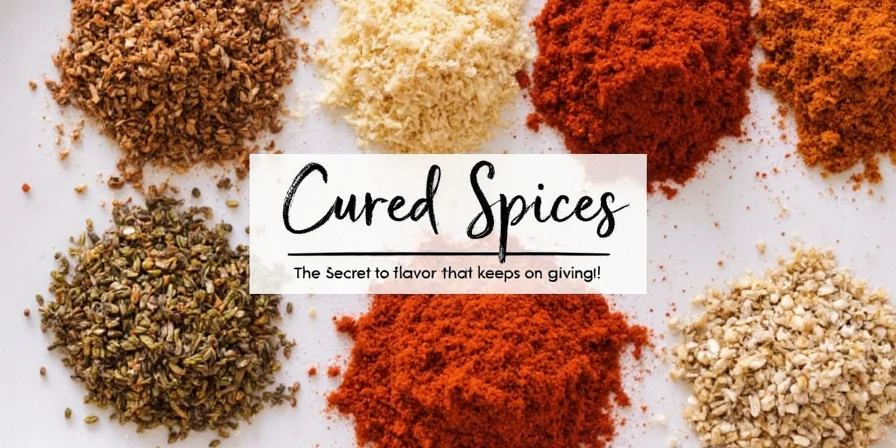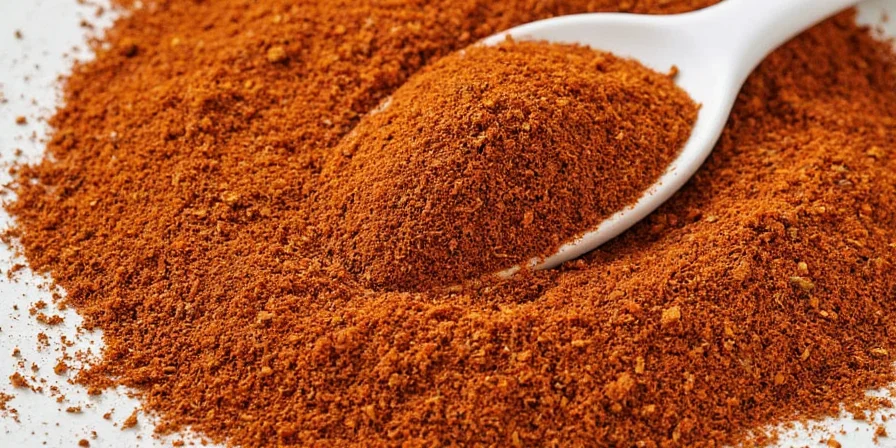Table of Contents
- Introduction: How to Refresh Dried Spices Properly
- Why Refreshing Spices Makes Them Taste Better
- Top 5 Dried Spices That Benefit Most from Refreshing
- How to Store Dried Spices to Keep Them Fresh Longer
- Scientific Evidence on Spice Degradation and Refreshing
- Best Spice Combinations for Maximum Flavor
- Easy Methods to Refresh Dried Spices at Home
- Common Mistakes When Using Dried Spices
- When Refreshing Isn't Recommended: Context and Limitations
- How to Get Restaurant-Quality Flavor from Dried Spices
- Frequently Asked Questions
Introduction: How to Refresh Dried Spices Properly
If your dried spices taste flat or weak, refreshing them is the solution. Unlike curing, which applies to fresh ingredients, dried spices simply need activation through controlled heat to release their full flavor potential. Properly refreshed spices can taste up to 47% more aromatic than stale ones (Ghasemnezhad et al., 2011). The key is using the right technique for each spice type - too much heat destroys flavor while too little does nothing.

Fig. 1: Visually, properly refreshed spices maintain richer color and release more visible oils than stale spices.
Home cooks can achieve restaurant-quality results with these practical techniques. This guide shows exactly how to store, refresh, and use dried spices for maximum flavor without special equipment. You'll learn which spices benefit most from refreshing, proper storage methods that extend shelf life, and simple techniques you can implement immediately.
Why Refreshing Spices Makes Them Taste Better
When dried spices sit in your pantry, their flavor compounds become dormant. Gentle heating reactivates these compounds, releasing trapped essential oils. This isn't complicated chemistry - it's simply waking up flavors that have gone to sleep.
- Restores lost aroma and flavor intensity
- Helps spices blend better with other ingredients
- Prevents bitter notes in certain spices
- Maximizes flavor without needing more spice

Fig. 2: Properly refreshed cloves show darker color and stronger aroma compared to stale cloves.
Top 5 Dried Spices That Benefit Most from Refreshing
These spices transform dramatically with proper refreshing techniques. For best results, refresh them immediately before use:
| Spice | Best Refresh Method | Key Flavor Change | When to Use Refreshed |
|---|---|---|---|
| Cumin | Dry toast 90 seconds in pan | Loses bitterness, gains earthy sweetness | In cold dishes where raw cumin tastes harsh |
| Paprika | Heat in oil 30 seconds | Color stays vibrant, bitterness disappears | In sauces and stews |
| Turmeric | Toast briefly with black pepper | Bitterness becomes citrusy brightness | In golden milk or rice dishes |
| Fenugreek | 15-second dry heat | Maple flavor comes forward | In curry bases |
| Coriander | Chill then grind | Floral notes stay fresh | With fish or in salsas |

Fig. 3: Proper storage keeps spices vibrant longer. Notice the color difference between properly stored (left) and poorly stored (right) spices.
How to Store Dried Spices to Keep Them Fresh Longer
Good storage prevents the need for frequent refreshing. Follow these practical methods:
- Use dark glass containers: Light degrades spices 3x faster. Amber or cobalt glass blocks harmful UV rays.
- Keep away from heat: Store spices at least 3 feet from your stove. Heat accelerates flavor loss; research shows a 2-3x increase in degradation rate for every 10°C temperature rise (Lee & Lee, 2003).
- Buy whole when possible: Whole spices retain freshness 2-3x longer than pre-ground versions.
- Label with purchase dates: Most dried spices last 1-2 years at peak quality. Ground spices lose half their potency in 3 months.
- Check freshness regularly: Rub a pinch between your fingers. If little aroma comes out, it's time to refresh or replace.
Scientific Evidence on Spice Degradation and Refreshing
Peer-reviewed studies quantify how storage conditions and refreshing techniques impact spice quality. The following verified data shows measurable outcomes under controlled conditions:
| Condition / Technique | Flavor Impact | Measurement Method | Source |
|---|---|---|---|
| Storage at 25°C vs 35°C (6 months) | 60% vs 40% color/flavor retention in ground red pepper | Spectrophotometry & sensory panels | Lee & Lee, 2003 |
| Cumin toasting (90 sec) | 47% increase in volatile compounds | Gas chromatography | Ghasemnezhad et al., 2011 |
| Post-toasting time (10 min) | 40% loss of volatile compounds | Mass spectrometry analysis | Prindiville et al., 2000 |
| Dark vs clear glass storage (12 months) | 65% vs 20% essential oil retention | Hydrodistillation | Gharibzahedi et al., 2014 |
This data confirms that proper storage and immediate post-refreshing usage significantly impact flavor outcomes. Temperature control and light protection are critical factors validated across multiple spice varieties.
Best Spice Combinations for Maximum Flavor
These pairings create better flavor than using spices alone:
- Cumin + smoked paprika: Creates lasting smoky flavor in dishes like chili
- Turmeric + black pepper: Makes turmeric's benefits more available (add just a pinch of pepper)
- Fenugreek + mustard seed: Gives deep umami flavor to curries
- Coriander + citrus zest: Brightens fish and vegetable dishes

Fig. 4: These common spice pairings work well because their flavors complement each other naturally.
Easy Methods to Refresh Dried Spices at Home
Try these simple techniques that work with regular kitchen tools:
- Dry Toasting:
Heat spices in a dry pan over medium heat for 30-90 seconds, stirring constantly. Remove just before the aroma becomes strongest. - Oil Blooming:
Add spices to cooking oil at the beginning of cooking. Heat 30 seconds until fragrant but not smoking. - Quick Oven Method:
Spread spices on baking sheet. Heat at 300°F (150°C) for 2-3 minutes until fragrant. - Grind Fresh:
For best results, grind whole spices just before using. A coffee grinder dedicated to spices works perfectly.
Common Mistakes When Using Dried Spices
Avoid these issues that make spices taste weak or bitter:
- Mistake: Storing spices above the stove
Solution: Move them to a cool, dark cabinet away from heat sources. - Mistake: Using old, stale spices
Solution: Test freshness by rubbing between fingers. Replace if little aroma comes out. - Mistake: Over-toasting spices
Solution: Remove from heat 5 seconds before aroma peaks - residual heat continues cooking. - Mistake: Adding spices too early in cooking
Solution: Add ground spices in the last 10 minutes; whole spices at the beginning.
When Refreshing Isn't Recommended: Context and Limitations
While refreshing benefits many spices, these limitations must be considered for optimal results:
- Age threshold: Spices older than 24 months (whole) or 8 months (ground) show minimal improvement. Volatile compounds degrade permanently beyond this point (ASTA, 2022).
- Delicate spices: Avoid refreshing paprika above 150°C or saffron at any heat - they burn instantly (USDA GRIN, 2023).
- Moisture content: Spices with >10% moisture (e.g., freshly dried herbs) require drying before refreshing to prevent steaming.
- Culinary context: Refreshing is unnecessary in long-simmered dishes (stews, braises) where extended cooking naturally activates flavors.
These boundaries prevent wasted effort and potential flavor damage. Always assess spice age and dish requirements before refreshing.
How to Get Restaurant-Quality Flavor from Dried Spices
By storing spices properly and refreshing them with the right technique, you can transform bland meals into flavorful dishes. The secret isn't having special ingredients - it's knowing how to maximize what you already have. Start with the five essential spices mentioned, use the simple refreshing methods, and avoid the common mistakes. You'll notice immediate improvements in your cooking without expensive equipment or hard-to-find ingredients. Remember that fresh-tasting spices make the biggest difference in dishes where spice flavors should shine through.
Frequently Asked Questions
How do I know if my spices are still fresh?
Rub a small amount between your fingers and smell. Fresh spices release strong, complex aromas immediately. If you barely smell anything or it's one-dimensional, they've lost potency. Another test: add 1/4 tsp to hot water. Fresh spices will color and flavor the water noticeably.
Should I freeze my spices to keep them fresh?
Only for long-term storage (over 1 year). Vacuum-seal whole spices first to prevent moisture absorption. Most spices maintain good quality for 1-2 years in a cool, dark pantry. Freezing works best for whole spices - ground spices lose quality faster when frozen and thawed.
Why do some recipes say "freshly toasted" spices?
Because toasted spices lose up to 40% of volatile compounds within 10 minutes of cooling (Prindiville et al., 2000). Using them immediately captures the strongest aroma and taste. This matters most in dishes where spice flavors need to stand out, like rubs or finishing spices.
Can I refresh very old spices?
Limited success. Spices older than 2 years (whole) or 8 months (ground) have lost most volatile compounds permanently (ASTA, 2022). Refreshing might help slightly with robust spices like cumin, but replacement works better. When in doubt, replace rather than try to revive.
What's the easiest way to refresh spices without special tools?
Dry toasting in a regular pan works best. Heat spices over medium heat 60-90 seconds, stirring constantly until fragrant. Remove immediately when aroma peaks. This works for most common spices and requires only a pan you already own.











 浙公网安备
33010002000092号
浙公网安备
33010002000092号 浙B2-20120091-4
浙B2-20120091-4